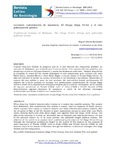Lecciones audiovisuales de marxismo: el Grupo Dziga Vertov y el cine políticamente político

Ver/
Use este enlace para citar
http://hdl.handle.net/2183/22574
A non ser que se indique outra cousa, a licenza do ítem descríbese como Atribución-CompartirIgual 3.0 España
Coleccións
Metadatos
Mostrar o rexistro completo do ítemTítulo
Lecciones audiovisuales de marxismo: el Grupo Dziga Vertov y el cine políticamente políticoAutor(es)
Data
2016Cita bibliográfica
Revista Latina de Sociología,2016,6(2):1-12.ISSN: 2253-6469
Resumo
[Resumen] Cuando Jean-Luc Godard se pregunta qué es el cine formula dos respuestas posibles. La repuesta de Hollywood, que entiende que el cine es dinero. Y la repuesta del cine soviético, que asume que el cine es útil para observar y pensar los fenómenos colectivos. Godard, después de la irrupción de mayo del 68, decide abandonar el cine mainstream para juntarse con Jean Pierre Gorin, Armand Marco y Jean Henri Roger, y juntos formar el Grupo Dziga Vertov. La idea del colectivo es iniciar un camino alternativo a las temáticas y las formas comerciales: el camino del cine político o, para ser más precisos, del cine forjado políticamente. El objetivo del artículo consiste en analizar tres producciones audiovisuales del Grupo Dziga Vertov a través de la arquitectura conceptual forjada por el autor de Das Kapital. En el análisis de algunas secuencias de Pravda (1969), Lotte in Italia (1969) y British Sounds (1969) descubriremos algunas de lecciones de marxismo a través de las diversas estrategias audiovisuales que forjan Godard y sus compañeros. [Abstract] When Jean-Luc Godard wonders what cinema is, it makes two possible answers. The answer from Hollywood, who understands that cinema is money. And the response of Soviet cinema, which assumes that cinema is useful to observe and think collective phenomena. Godard, after the irruption of May of the 68, decides to leave mainstream cinema to meet with Jean Pierre Gorin, Armand Marco and Jean Henri Roger, and together form the Dziga Vertov Group. The idea of the collective is to start an alternative way to thematic and commercial forms: the way of the political cinema or, to be more precise, the politically forged political cinema. The objective of the article is to analyze three audiovisual productions of the Dziga Vertov Group through the conceptual architecture forged by the author of Das Kapital. In the analysis of some sequences of Pravda (1969), Lotte in Italia (1969) and British Sounds (1969) we will discover some of the lessons of Marxism through the different audiovisual strategies that forge Godard and his companions.
Palabras chave
Marxismo audiovisual
Grupo Dizga Vertov
Jean-Luc Godard
Cine y política
Audiovisual marxism
Dziga Vertov Group
Film and politics
Grupo Dizga Vertov
Jean-Luc Godard
Cine y política
Audiovisual marxism
Dziga Vertov Group
Film and politics
Versión do editor
Dereitos
Atribución-CompartirIgual 3.0 España
ISSN
2253-6469






